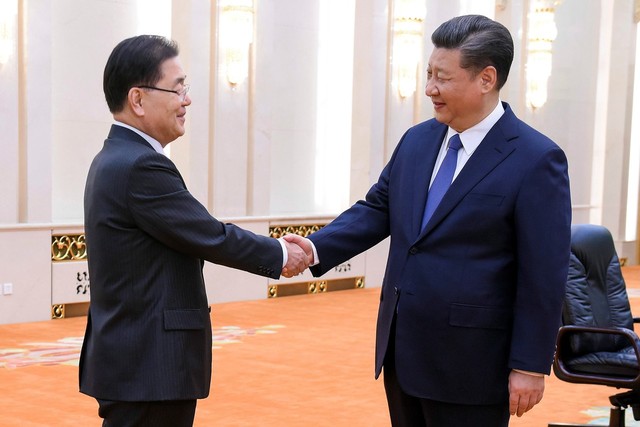 |
|
South Korean special envoy Chung Eui-yong shakes hands with Chinese President Xi Jinping at the Great Hall of the People in Beijing on Mar. 12. (AP/Yonhap News)
|
“True dedication can make grass grow on top of a stone,” says Chinese leader
During his visit to China, Blue House National Security Office director Chung Eui-yong expressed his gratitude to China’s support on Korean Peninsula issues. Chinese President Xi Jinping welcomed the recent progress on the Korean Peninsula and acknowledged South Korea’s role. “We’re happy that dialogue has been taking place between North Korea and the US and that major progress is being achieved overall on the Korean Peninsula thanks to South Korea’s efforts,” Chung said. After arriving in Beijing on the morning of Mar. 12, Chung had an interview and luncheon with Chinese State Councilor Yang Jiechi for over four hours before meeting Xi at the Great Hall of the People at 5 pm and briefing him for 35 minutes on the results of Chung’s visits to North Korea and the US. According to statements made by the Blue House and China, Xi expressed his support, telling Chung that he hopes “the inter-Korean summit and North Korea-US dialogue go smoothly.” “True dedication can make grass grow on top of a stone. If each country focuses on the fundamental goals of peace, stability and denuclearization on the Korean Peninsula, the thick ice will melt and a spring day with flowers in bloom will come to the Korean Peninsula as well,” Xi said. “President Moon thinks that the recent positive changes in the situation on the Korean Peninsula are due to the special leadership shown by China, and by you in particular,” Chung told Xi. He also brought up principles long advocated by China – namely, that the North Korea-US conflict is at the heart of the North Korean nuclear issue and that South and North Korea should take the lead in resolving inter-Korean issues – while expressing South Korea’s “gratitude” for the “great contribution” that China has made. Chung’s remarks appear to have been motivated by concerns raised recently in some quarters that China has been ignored in the latest developments. China has aggressively participated in the UN Security Council’s sanctions resolutions against North Korea, severely cutting its economic cooperation with the North. The fact is that North Korea-China relations are not as they once were, illustrated by the fact that Xi and North Korean leader Kim Jong-un have yet to meet in the five years since Xi took power. Now that North Korea has reached out to the US, some experts are predicting that the North will walk a tightrope between the US and China as Myanmar and Vietnam have done, and the South Korean government appears to be placing particular emphasis on China’s efforts in order to ease China’s concerns about such issues. It is also seen as unusual that Xi met Chung personally during the plenary meetings of the National People's Congress and the Chinese People's Political Consultative Conference, Chinese political events of immense importance that typically bring the diplomatic schedule. Xi made time to meet Chung despite attending various meetings each day and listening to a variety of viewpoints while major agenda items, including appointments for his second term in office, are still under deliberation. Since this was the very day after the passing of a constitutional revision that eliminated presidential term limits on Mar. 11, trends in Chinese public opinion were under unusual scrutiny. This is evidence that Xi is watching the rapidly unfolding situation on the Korean Peninsula with keen interest. China’s use of term “special envoy” conveys respectful treatment of Chung Eui-yong Another notable aspect of China’s treatment of Chung was the use of the term “special envoy.” Xi referred to Chung as a “special envoy,” while Yang Jiechi called Chung “President Moon Jae-in’s special envoy” when they met earlier in the day. That same day, state-run Chinese Central Television’s main news program Xinwen Lianbo referred to him as “Chung Eui-yong, special envoy of the South Korean President.” Even though the Blue House and the South Korean Embassy to China explained that Chung did not go to China in the capacity of a special envoy acting on behalf of the president, this title can be seen as China’s way of giving Chung the treatment befitting a special envoy. This interpretation was called into question, however, by the seating arrangement for Chung and Xi’s meeting, in which Xi took the place of honor and Chung sat in the seat of the presenter, just as when special envoy Lee Hae-chan visited China in May 2017. By Kim Oi-hyun, Beijing correspondent and Seong Yeon-cheol, staff reporter Please direct questions or comments to [english@hani.co.kr]






